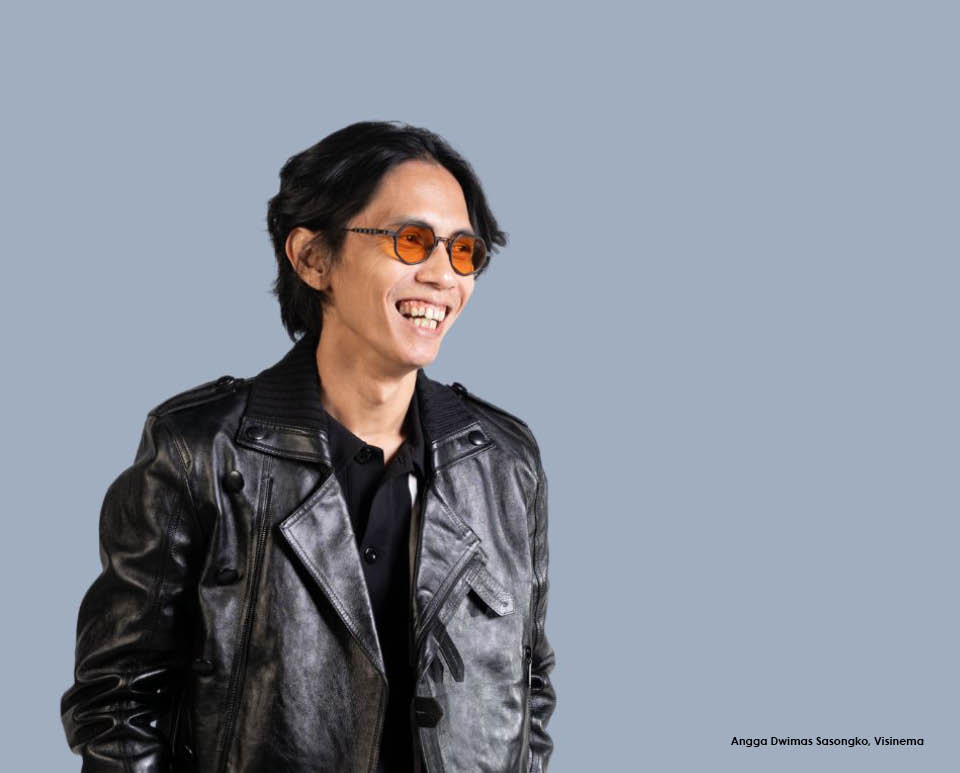
Among other tags, Indonesian filmmaker and businessman Angga Dwimas Sasongko has been called a “visionary” and a “disruptor”. And that was long before Visinema Pictures, the company he founded and leads as CEO, backed Jumbo – Indonesia’s highest‑grossing film ever.
He supports the best kinds of disruption, but doesn’t directly answer the question of how he feels about the labels. “Every day, I just try to do better than yesterday,” he says.
“I believe that if we, as Visinema, can give emerging talent an opportunity to shine, can become a platform for talent and creators to make a living... disruption will come, not from myself, but from the creators who work in that healthy environment”.
“I’m only trying to give a platform for people who have the passion, ideas. And the courage to execute, to change the game of the industry,” he says.
Himself included. Yes, he says, it was difficult at first to expand beyond his core as a filmmaker to hard-core business, driving group vision, answering to investors...
Pandemic-driven introspection led to a conviction that, “if I want to survive, if I want to grow and make sure that Visinema will be a home for creators well beyond my leadership”, this is what he needed to do.
At the same time, he steers clear of either-or choices. “We have to be able to live without binaries... there is no art versus commerce, there is no global versus local, there is no artist versus entrepreneur. We can build from the center, and we are not the only ones doing it,” he says.
“It’s not about chasing to be number one... but to be able to find the balance between those binaries. That’s something I try to live every day, and now I’m enjoying”.
Sasongko talks about opportunities rather than trends. “There is a huge untapped market in Indonesia. We need to stop focusing on trends and simply search for the opportunities,” he said on stage at the annual APOS event in Bali in June.
His most recent opportunity (and his biggest, as it turns out) came in the shape of a chubby boy called Don (aka Jumbo to the bullies) and a ghost called Meri. As they try to help each other, the two learn the true mea...
Among other tags, Indonesian filmmaker and businessman Angga Dwimas Sasongko has been called a “visionary” and a “disruptor”. And that was long before Visinema Pictures, the company he founded and leads as CEO, backed Jumbo – Indonesia’s highest‑grossing film ever.
He supports the best kinds of disruption, but doesn’t directly answer the question of how he feels about the labels. “Every day, I just try to do better than yesterday,” he says.
“I believe that if we, as Visinema, can give emerging talent an opportunity to shine, can become a platform for talent and creators to make a living... disruption will come, not from myself, but from the creators who work in that healthy environment”.
“I’m only trying to give a platform for people who have the passion, ideas. And the courage to execute, to change the game of the industry,” he says.
Himself included. Yes, he says, it was difficult at first to expand beyond his core as a filmmaker to hard-core business, driving group vision, answering to investors...
Pandemic-driven introspection led to a conviction that, “if I want to survive, if I want to grow and make sure that Visinema will be a home for creators well beyond my leadership”, this is what he needed to do.
At the same time, he steers clear of either-or choices. “We have to be able to live without binaries... there is no art versus commerce, there is no global versus local, there is no artist versus entrepreneur. We can build from the center, and we are not the only ones doing it,” he says.
“It’s not about chasing to be number one... but to be able to find the balance between those binaries. That’s something I try to live every day, and now I’m enjoying”.
Sasongko talks about opportunities rather than trends. “There is a huge untapped market in Indonesia. We need to stop focusing on trends and simply search for the opportunities,” he said on stage at the annual APOS event in Bali in June.
His most recent opportunity (and his biggest, as it turns out) came in the shape of a chubby boy called Don (aka Jumbo to the bullies) and a ghost called Meri. As they try to help each other, the two learn the true meaning of friendship.
The animated film, Jumbo, released theatrically in Indonesia in March this year after five years of production, was an outsize success. With a production budget of Rp22 billion/US$1.4 million (source: IMDb), the film’s global box office is said to have topped US$25 million. The bulk of this came from its home market, where in its first six weeks it surpassed Frozen 2 before going on to become Indonesia’s highest‑grossing film ever.
“You go big, or you go home,” Sasongko says of his decision more than five years ago to back the project. The question at the time was: just how big did he want to go? “The benchmark at the very beginning was to beat Frozen 2. That was our target,” he says, talking to ContentAsia three months after the film opened in Indonesia.
Hindsight clearly brought relief. Day one in theatres didn’t look even a tiny bit good. At only 50,000 admissions, Sasongko saw his biggest bet turning sour. Historically, box office stats in Indonesia show that a day one at 50,000 means the film won’t even hit one million.
“Everything seemed dark,” he says. “We did everything. We tried so hard to give the audience the best animation that Indonesia can produce. We tried to make sure that the story [would resonate] with Indonesia first... within a Southeast Asia world”. Day two was tense. Day three brought a sliver of optimism, which grew on day four... By day 10 he knew he had a winner. “When we reached the first two million before day 10, I believed that we could pass Frozen 2.”
Given the outcome, the risk seems smaller than it was for a studio known for films such as horror feature Blood Debt (2024), Stealing Raden Saleh (2022), Letters from Prague (2016) and Keluarga Cemara (2019).
For Sasongko, the to-do-or-not-to-do animation/Jumbo was a turning point in his filmmaking career.
“When I decided to invite investors to Visinema in 2018, I realised that I’m no longer a filmmaker who runs a studio. I’m an entrepreneur with a challenge and a responsibility,” he says, talking too about growth ceiling, available seats, and the book that changed his trajectory – Lawrence Levy’s memoir To Pixar and Beyond: My Unlikely Journey with Steve Jobs to Make Entertainment History. “I realised that from the business perspective, I had to break the ceiling,” he says.
To do that, he had to change the perception of Visinema as primarily a film production company, defined by annual film output or by ticket sales.
Instead, he developed an IP-based model. “There are three advantages to making IP our backbone,” he says.
First, he set a 40% cap on box office revenue as a percentage of the total. Second, he created recurring revenue streams from Visinema shows. And third – and perhaps most important – was to keep experimenting, “keep creating something new, keep giving emerging talent new opportunities, keep creating room to empower”. For all the time/investment challenges, animation offered a solution.
He’s already well into Jumbo extensions in the form of “experiences” – an area of experimentation since 2015 and the release of his film Filosofi Kopi.
The original film explores coffee culture. In 2017, he directed the sequel Filosofi Kopi 2: Ben & Jody. A TV series followed in 2018, along with an online platform using gamification elements, and then a spin-off documentary, Filosofi Kopi: Aroma Gayo in 2021. Alongside all that, he developed a chain of artisanal coffee shops, complete with merchandise.
Sasongko is confident about leveraging Jumbo’s success into a bigger consumer experience, mostly because he says there is already a global playbook and he knows he doesn’t have to be “the smartest person in the room”.
To develop the Jumbo IP and licensing business, he turned to Herry Salim, the former head of Disney Indonesia and veteran Unilever boss, and Aldi Haryopratomo, the former CEO of Gojek’s digital wallet GoPay, both of whom have joined Visinema.
The Jumbo gameplan involves the larger ambition to create “evergreen IP”.
Sasongko says “Jumbo is real proof that... when you invest in craft, invest in quality, invest in empathy, the audience will respond”.
There’s something else, which he says Jumbo shares with record-breaking Chinese animated film Ne Zha 2. “It’s not only because of the story, not only because it’s cute... [Jumbo’s success] is also because it gives pride to its audience”.































